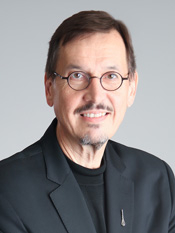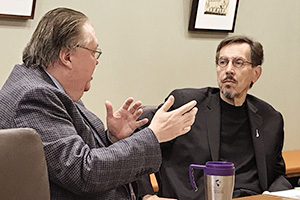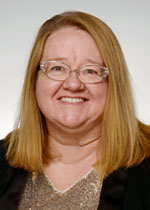CRH Founder Is a Mover and Shaker in Rural Healthcare
By Brenda Haugen on

Kevin Fickenscher, MD, likes to stir things up. But he wears a small whisk on his lapel to remind himself of the fine line between stirring too much and stirring too little. An avid cook, Fickenscher realizes that if you stir too much, you make a mess. If you stir too slow, you don't bring the ingredients successfully together. The whisk analogy fits almost any area in life.
"You have to stir just right," he said. "It's been my symbol for 25 years."
Originally from Bismarck, Fickenscher was the founding director of what became the Center for Rural Health (CRH) at the University of North Dakota (UND) School of Medicine & Health Sciences (SMHS). He now lives in Maine and serves as the founder and president/CEO of CREO Strategic Solutions, LLC, a consultancy offering advice to providers with a focus on technology applications, telecare services, informatics, and leadership development. Fickenscher recently returned to the UND SMHS for a visit and was the Dean's Hour speaker, where he talked to students and faculty about embracing telecare.

Fickenscher's roots at UND run deep. He first came to the University as a student in 1970. He knew he wanted to be a doctor, but he initially went into psychology because his advisor told him he should think about what would happen if he didn't get into medical school.
I had a number of detractors who didn't think I would quite make it, including my high school biology teacher, who was the first person I called when I got accepted (to medical school).
"I had a number of detractors who didn't think I would quite make it, including my high school biology teacher, who was the first person I called when I got accepted (to medical school)," Fickenscher recalled with a smile.
As an undergraduate, Fickenscher quickly became deeply involved in many activities. "I was always sort of a community activist type," he said.
When a measles outbreak struck campus, Fickenscher organized students for a measles immunization program. That led to the creation of CHIP—Council for Health Interdisciplinary Participation. At the time, UND nursing, medical school, and social work students were all very separate, with little communication among the various disciplines. Through CHIP, health sciences students began collaborating on projects.
During medical school, Fickenscher took a year off when he was elected president of the American Medical Student Association. During his presidency, he lived in Chicago and even had the opportunity to testify before Congress. Fickenscher advocated for renewal of the National Health Service Corps and for changes in the medical education curriculum to be more inclusive of clinical experiences as well as basic sciences.
In addition, he visited all the major pharmaceutical companies. Students at the time were having strong philosophical differences with pharmaceutical industry, which was using prisoners for drug tests, Fickenscher explained.
"We really felt that that was inappropriate," he said.
After graduating from medical school at UND in 1978, Fickenscher was accepted into the Residency Program in Social Medicine (RPSM) in New York City as a family practice graduate. It was an eye-opening experience.
"It taught us about the social dimensions of disease as well as the clinical and physical dimensions," he said.
As part of his first week as a resident, the RPSM had Fickenscher apply for food stamps, which he described as a "hellacious experience."
"I learned a lot about what my patients had to go through," he said. "And that was the intent of the program."
When Fickenscher had an opportunity to be chief resident, UND Medical School Dean Tom Johnson came to see him in New York. Johnson asked Fickenscher to come home. Johnson had secured funding for a program in rural health and needed someone to run it. He wanted that someone to be Fickenscher.
To me it seemed like the ultimate social medicine project because I was going to be coming back home, and I was given this very broad charge of 'solve rural health problems.'
"To me it seemed like the ultimate social medicine project because I was going to be coming back home, and I was given this very broad charge of 'solve rural health problems,'" Fickenscher said.
When the Rural Health Program started in 1980, it had a $73,000 budget and Fickenscher was the only employee. On his first day, Fickenscher went to Dean's Office in what is now Columbia Hall and asked Johnson where he should go. Johnson told him he thought there was some empty space on the second floor. So Fickenscher went to the second floor and picked an office. He quickly returned to the Dean's Office because he didn't even have a desk. Johnson said he thought there was some surplus furniture and equipment in the basement.
"So I got an old [IBM] Selectric typewriter and started the Rural Health Program," Fickenscher said.
From the very start, Fickenscher didn't want what was to become the CRH to be a traditional academic research program.
I wanted us to help the people of North Dakota. So we were going to help make healthcare better. That was my overriding philosophy.
"I wanted us to help the people of North Dakota," he said. "So we were going to help make healthcare better. That was my overriding philosophy."
He didn't know exactly what that meant, so he visited physicians in rural North Dakota. He also reached out to legislators across the state. He asked all of them what they wanted his office to do.
"The clear message was if you sit in Grand Forks, you're not going to help us. So don't sit in Grand Forks," Fickenscher said.
So Fickenscher went to work traveling the state. The CRH worked with rural hospitals to help them find ways to continue developing and sustaining healthcare services for area residents. It also looked at workforce issues and became involved in a successful, albeit unusual, physician recruitment program.
"We had some slightly different approaches," Fickenscher said with a chuckle. "For example, our recruiters had a contest for a couple of docs to see if they could get them married off locally so that after we recruited them we could keep them. So we did things like that. It was a lot of fun."
Because of the work going on in North Dakota, several of the surrounding states reached out to the program, giving the CRH a more regional focus. When Fickenscher moved on from the CRH after nine years with the program, it included 15 staff members, a $1.8 million budget, and a number of projects. Through the years, the CRH has continued to grow, and Fickenscher has been pleased to see the Center's mission continue.
I'm really proud of what the Center has become. It's very exciting to come back and see what folks have accomplished and are accomplishing. It's very satisfying to see that. And the core philosophy around making healthcare better still exists.
"I'm really proud of what the Center has become," Fickenscher said. "It's very exciting to come back and see what folks have accomplished and are accomplishing. It's very satisfying to see that. And the core philosophy around making healthcare better still exists."
He's also excited to see what the future holds in rural health and believes rural America is going to be in the forefront in using virtual technologies in healthcare.
"I really believe that all of healthcare is being challenged in some really profound ways with new technologies that are evolving, that are replacing the entire tradition, if you will, of how we take care of people," he said. "Specifically, I believe, we're getting into an era where the use of virtual technologies is becoming increasingly important as a modality and as a very important component of the overall delivery of care that didn't exist 20 years ago.
"I think that rural health will end up being better."
This article originally appeared in the Summer 2018 issue of North Dakota Medicine.


 was a communications specialist at the Center for Rural Health at the University of North Dakota School of Medicine & Health Sciences in Grand Forks.
was a communications specialist at the Center for Rural Health at the University of North Dakota School of Medicine & Health Sciences in Grand Forks.



